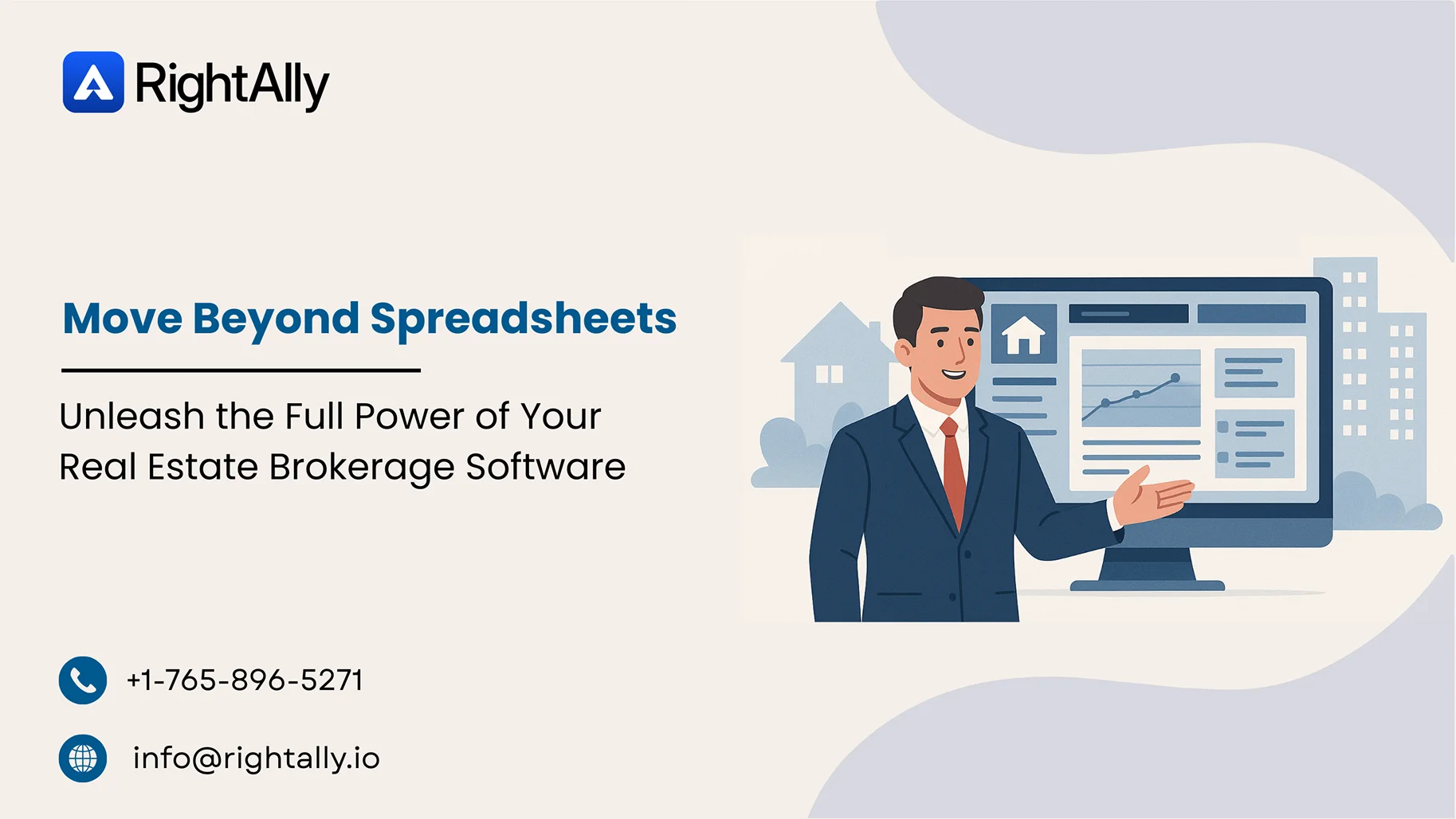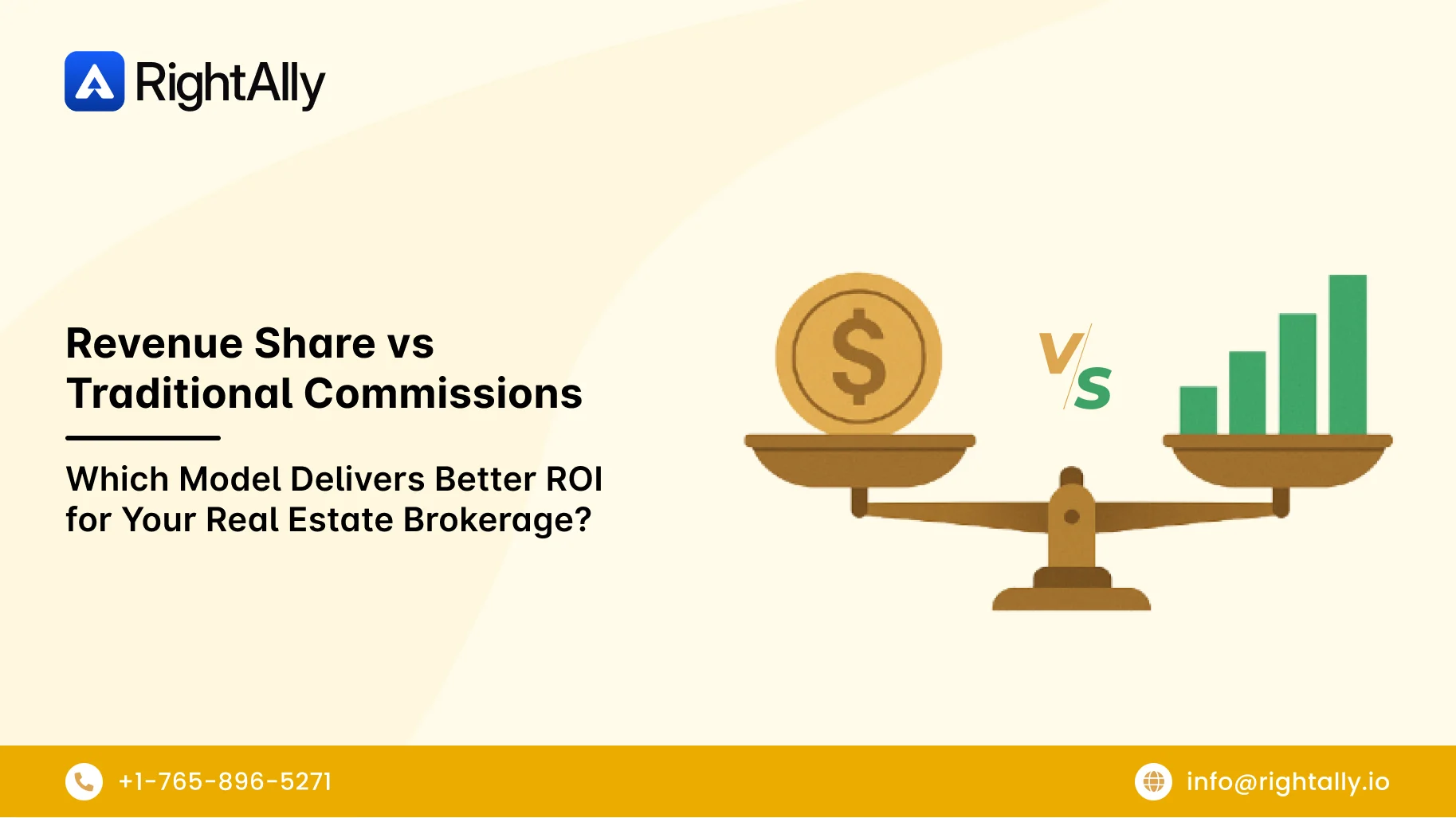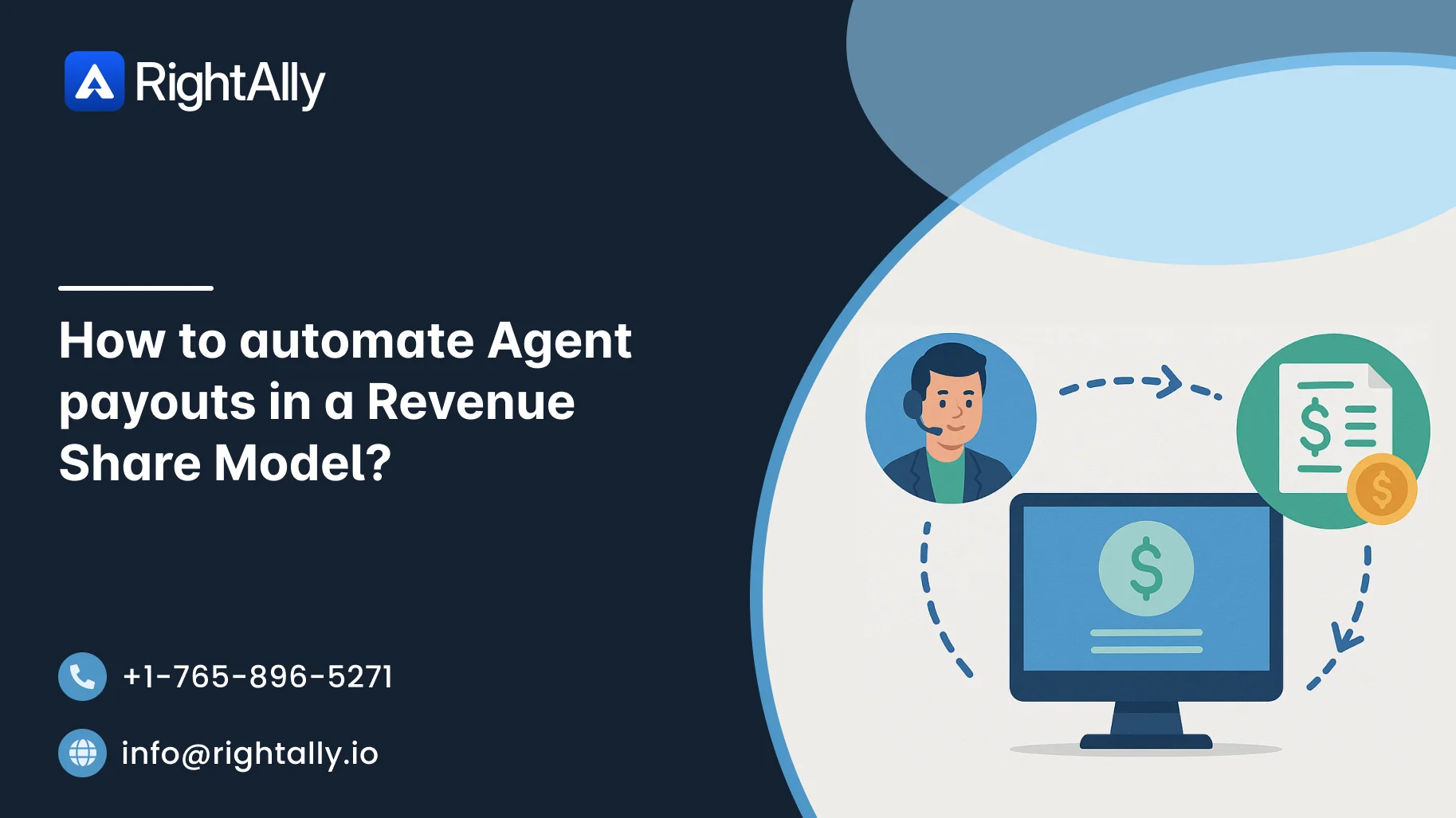Table of Content
- Introduction
- Understanding Cloud Computing in Real Estate
- Key Drivers Behind the Shift to the Cloud
- Use Cases: Cloud in Action for Brokerage Firms
- Step-by-Step Process of Shifting from Traditional Brokerage to Cloud Brokerage
- Overcoming the Challenges to a Cloud-First Brokerage
- What the Future Holds: Cloud-First Brokerages
- Conclusion
- Frequently Asked Questions
Summary
This guide explains why real estate brokerage firms are moving to the cloud. Explore the fundamentals of cloud computing, key drivers of adoption, practical use cases, and a step-by-step approach to transitioning from traditional systems. Learn how brokerages can overcome challenges and prepare for a cloud-first future.
According to a Grand View Research report, cloud adoption accounted for 52.37% of the real estate software market by 2022. This was a tipping point that signaled fundamental change. According to Accenture, moving workloads to the cloud leads to Total Cost of Ownership savings of 30-40%, while cloud CRMs and transaction platforms reduce manual data entry by up to 90%.
These are proven results achieved by brokerages moving to the cloud. If you’re still sitting on the sidelines, here are the top reasons why real estate brokerage firms are making the move and how you can also plan your cloud migration.
Understanding Cloud Computing in Real Estate
For the uninitiated, cloud computing in real estate means running your brokerage with internet-assisted services. Just think about it. Every tool, document, and system your agents need is available instantly from any device, anywhere in the world.
It's an unbeatable competitive advantage. Your agents get to be a lot more productive than they'd be otherwise. A client needs some info while chatting with them during a private tour? They grab their smartphone and get what they need in a couple of clicks.
The benefits of cloud-based real estate brokerage are immense. eXp Realty built its entire brokerage in the cloud, serving 86,000+ agents without a single agent office. Such cloud real estate brokerages have higher profits, happier agents, and better client outcomes.
However, there are some misconceptions holding brokerages back, which dissolve under examination. Security concerns vanish when you realize major cloud providers invest billions annually to safeguard their systems. Their protection far exceeds what any brokerage could achieve independently.
Control worries disappear when cloud dashboards provide real-time visibility into every metric that matters while providing role-based data access. And, the idea that cloud platforms are “one-size-fits-all” melts away once you see the depth of industry-specific options (like plug-and-play integrations, MLS-ready document vaults, etc.) that can be mixed and matched to fit a boutique five-agent shop or a multi-state enterprise.
Cloud-based models ensure every virtual real estate brokerage finds its perfect fit. They offer unmatched economies of scale with instant upscaling and downscaling to optimize costs without inhibiting growth. At RightAlly, we also provide instant functionality without technical complexity while providing dedicated resources for enhanced control. With 89% of businesses across industries are already operating with a multi-cloud strategy, the question isn't whether to adopt cloud technology, but how quickly you can implement it to capture its benefits.
Key Drivers Behind the Shift to the Cloud
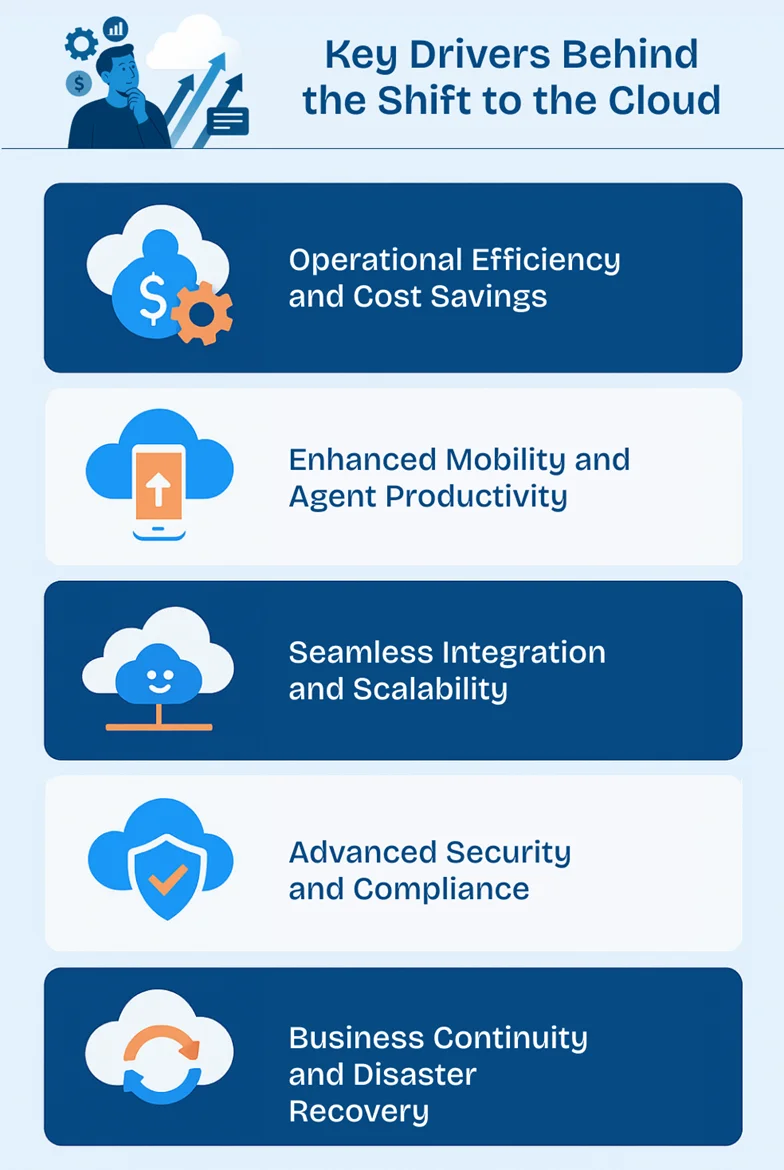
Here are the key drivers behind the shift:
1. Operational Efficiency & Cost Savings
As already discussed, the cloud-based real estate brokerage yields massive operational efficiency gains. Some of them include:
a) CapEx to OpEx Shift
The transformation from capital to operational expenditure fundamentally improves financial flexibility. Instead of massive upfront server investments that depreciate rapidly, the pay-as-you-go cloud model aligns costs directly with revenue.
This shift frees capital for revenue-generating activities like agent recruitment, marketing innovation, and market expansion. Nearly 94% of IT decision makers believe that cloud reduces both setup and maintenance costs, with almost 55% stating their IT costs would drop by at least 30% through cloud implementation.
It makes sense when you think about it. Not only do you make an upfront payment for your on-premises IT setup, but you also need dedicated IT staff for setting up and maintaining this infrastructure. Considering that the average base salary of an IT engineer in the U.S. is over $88,000, the cost savings with the plug-and-play model of cloud service providers are immense.
b) Automated Workflows
Simply put, cloud-based real estate revenue sharing solutions, CRMs, and transaction platforms reduce your manual errors, omissions, and negligence. They also update your system with every activity that takes place in real-time. Such systems transform multi-day processes and bureaucracy into hours of productive work.
As an example, the workflow may automatically send an email of "Dos and Don'ts" to the buyer containing a clear checklist of next steps once the offer is accepted. Meanwhile, it automatically updates the transaction record, schedules key dates in the closing timeline, and notifies the escrow officer, all without an agent lifting a finger.
Doing so saves time while reducing liability. By ensuring every client gets timely, compliant information, brokerages avoid costly oversights (like purchasing a car a few days before mortgage approval). Agents, freed from repetitive administrative tasks, can focus on relationship building, negotiations, and deal generation.
c) Space Reallocation
One of the least discussed, but most financially impactful, benefits of cloud adoption is the liberation of physical space. Traditional brokerages often dedicate entire rooms (or even floors) to file cabinets, paper archives, bulky servers, and IT workstations. Every square foot of that space is money, including rent, utilities, and maintenance, that’s generating zero revenue.
Cloud platforms erase that overhead. Every document, signature, transaction record, and compliance file moves to secure digital storage, accessible in seconds from any device. Physical server rooms vanish. Filing cabinets become obsolete. Entire administrative wings can be streamlined or eliminated.
The ripple effect is enormous. In high-cost commercial markets, reclaiming just 500 square feet of space can save $25,000–$40,000 per year in rent alone. That’s before factoring in utilities, cleaning, insurance, and furniture costs. Those savings can be reinvested into agent recruitment bonuses, hyper-targeted marketing campaigns, or tech tools that give your virtual real estate brokerage an undeniable edge.
2. Enhanced Mobility & Agent Productivity
Another major advantage is realized in terms of on-the-go benefits and ready access to high-productivity systems.
a) Anytime, Anywhere Access
In real estate, timing is everything. The difference between winning and losing a deal can come down to how fast you respond, how quickly you deliver documents, or how seamlessly you answer a client’s question in the moment. Cloud platforms remove the “I’ll get back to you when I’m in the office” barrier entirely.
With a fully cloud-enabled brokerage, every listing detail, transaction record, contract template, and client file is just a few taps away, whether your agents are at a property showing, in a coffee shop, or halfway across the country. Need to send over the latest comps while walking through a home with a buyer? It’s done before you’ve reached the kitchen. Need a signed addendum back from the seller at 9 p.m.? They can review and sign from their phone in minutes.
This kind of mobility is a revenue multiplier. Clients feel the difference when every question is answered immediately and every request is fulfilled without delay. Deals move faster, fewer opportunities slip through the cracks, and agents spend more time in front of clients instead of behind a desk.
b) Integrated Collaboration
Real estate transactions involve a moving cast of players, such as agents, clients, lenders, attorneys, inspectors, escrow officers, etc., each with their timelines, priorities, and communication styles. In a traditional setup, keeping everyone aligned can feel like herding cats across a minefield of email threads, phone calls, and misplaced attachments.
Cloud platforms replace that chaos with a single, integrated workspace where every stakeholder sees the same information, in real time, from anywhere.
3. Seamless Integration & Scalability
In most brokerages, new technology comes with a hidden tax: the disruption of swapping systems, retraining teams, and wrestling with compatibility issues. Cloud-based real estate brokerages turn that headache into a non-event.
a) Unified Ecosystem
A brokerage’s biggest efficiency killer is fragmentation with scattered tools, disconnected data, and agents wasting time bouncing between systems. Cloud technology replaces that patchwork with a single, cohesive environment where every function lives under one roof.
Your CRM speaks directly to your marketing platform. Your transaction management tool syncs automatically with your document storage. Compliance records, commission tracking, and performance analytics are all drawn from the same source of truth, accurate, up-to-date, and accessible in seconds.
b) High-Level Insights and Control
Running a brokerage without real-time intelligence is like flying blind. You only know what happened after it’s too late to act. Cloud platforms replace that lag with live, granular visibility into every aspect of your business.
From a single dashboard, leadership can track deal pipelines, monitor agent performance, spot bottlenecks in transactions, and compare revenue trends across offices or teams. So, whether you're drilling down into an individual agent’s conversion rate or zooming out to view year-over-year growth, both are just a click away.
c) Elastic Resources
In real estate, workload doesn’t flow; it surges. Spring’s flood of transactions, sudden market rebounds, or unexpected deal volume spikes can overwhelm on-premises systems. Likewise, you may be running expensive resources when the deal volume is just not there. Cloud platforms solve these problems with built-in elasticity.
When demand spikes, your computing power, storage, and processing capacity scale up automatically so you don't have to scramble for new servers during network overload. When business slows, resources contract, so you’re not paying for idle capacity.
In a nutshell, you’re never constrained by the limits of your tech infrastructure. You operate at full throttle when opportunity knocks and pull back when the market cools, maximizing efficiency and profitability in every season.
4. Advanced Security & Compliance
As a brokerage, you handle sensitive financial records, personal identification, and legal documents. Cloud platforms help you stay compliant as they are built with compliance at their core, aligning with strict regulations such as CCPA and state-level real estate requirements.
a) Enterprise-Grade Protections
Major cloud providers spend billions annually on cybersecurity, an investment level no individual brokerage could match. This buys constant system monitoring, AI-powered threat detection, encrypted data transmission, and redundant backups stored in geographically dispersed data centers.
Such systems are stress-tested against emerging cyber threats, patched in real time, and fortified with layers of authentication to keep bad actors out. Even in the event of a natural disaster or local outage, operations can continue seamlessly, thanks to instant failovers available.
For leadership, the takeaway is simple: you’re not just “in the cloud.” You’re inside the same fortress that protects global banks, Fortune 500 companies, and top government agencies. The technology keeping your brokerage secure is battle-tested at the highest level.
b) Regulatory Adherence
Automated retention policies and comprehensive audit trails simplify compliance with the Gramm-Leach-Bliley Act (GLBA), state data protection laws, and NAR guidelines. Cloud platforms make regulatory compliance systematic rather than scrambled, protecting your brokerage from costly violations.
5. Business Continuity & Disaster Recovery
Cloud platforms eliminate a single point of failure. With every file, system, and workflow hosted off-site and accessible from anywhere, your team can keep working no matter what’s happening locally.
a) Georedundancy
Distributed data centers ensure operations continue regardless of local disruptions. Your data exists simultaneously in multiple locations, so hurricanes, power outages, or other disasters can't stop your business. While traditional brokerages face extended recovery periods, cloud-based operations maintain continuity even during severe outbreaks.
b) Rapid Recovery
Cloud systems boast an uptime of up to 99.99%, which is equal to a downtime of less than 5 minutes in a month. For brokerages, this is peace of mind at an entirely new level. Now, your operations aren’t tied to a building, a server room, or even a city. They’re anchored to a global infrastructure designed to survive the unexpected.
Use Cases: Cloud in Action for Brokerage Firms
eXp Realty's 86,000+ agents operate entirely through cloud infrastructure, eliminating office overhead while delivering superior agent economics. REAL Broker reports that their agents achieve higher transaction volumes and close more total volume than competitors, with cloud efficiency driving both agent satisfaction and profitability.
Between 2023 and 2024, 10,500 agents left traditional legacy brokerages while exactly the same number joined low-fee, cloud-based brands. On top of dissatisfaction with old models, this migration was driven by the active pursuit of better technology, economics, and flexibility that cloud brokerages provide.
1. End-to-end digital transactions (from offer to close)
Brokerages standardize on cloud transaction suites with forms, eSignature, compliance review, and broker approvals. So, agents push deals forward in one workspace. DocuSign reports that agreements turn around up to 25× faster, wherein more than 80% of documents are signed in a day and about 44% in less than 15 minutes. This speed compounds across multi-party closings.
2. Commission automation and back-office controls
Purpose-built back-office platforms replace spreadsheets with automated splits, caps, ACH payouts, and audit-ready ledgers. Solutions like Lone Wolf and BrokerSumo are built specifically for real-estate commissions and agent billing, streamlining almost all areas of modern-day business.
3. Resilient, compliant operations
Cloud providers deliver geographically redundant storage and high-availability services, with SLAs in the 99.9%–99.99% range and design patterns (multi-AZ, multi-region) that keep systems available during local outages, critical for deadlines and earnest-money timing.
Step-by-Step Process of Shifting from Traditional Brokerage to Cloud Brokerage
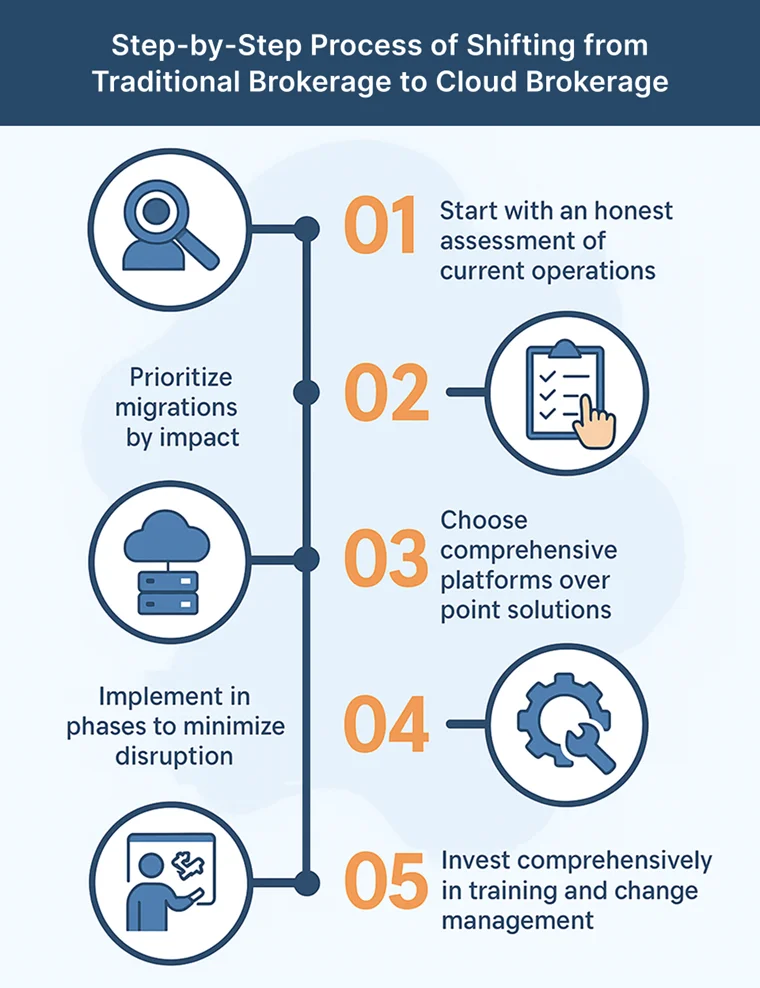
1. Start with an honest assessment of current operations
Document every system, process, and pain point. Most brokerages discover 20-30 hours of weekly inefficiency that cloud automation can reclaim immediately. This baseline becomes your transformation roadmap.
As you map this baseline, look first at the areas where brokerages usually uncover quick wins. These include manual commission workflows, mapping where and how you manage documents, signing up with an eSign partner for better document turnaround time, mapping the transaction cycles, and agent onboarding bottlenecks.
2. Prioritize migrations by impact
Address your biggest operational challenges first. These could be in commission processing, document management, or lead distribution. Some of the metrics to track include:
- Agent onboarding time
- Agent onboarding cost
- Cost per closing
- Time to close
- Agent NPS
- Time-to-payout.
Target the metrics that matter to you the most. Quick wins build momentum and demonstrate value to skeptical team members.
3. Choose comprehensive platforms over point solutions
Isolated tools risk creating new silos. Then, there's also an issue of compatibility with the real-estate-specific processes, conventions, and regulations. So, look for providers with proven real estate expertise on top of robust integrations and APIs for future expansion.
4. Implement in phases to minimize disruption
Email and calendar systems offer low-risk starting points. If done already, follow with CRM and revenue share migration to centralize client data, and then transaction management for deal flow optimization. Each successful phase builds confidence for the next while also taking your agents and employees on board.
5. Invest comprehensively in training and change management
Technology succeeds through adoption, and adoption requires understanding. When teams grasp how cloud technology improves their daily work, resistance transforms into enthusiasm. Make sure to have a comprehensive training regime, beginning with your internal staff. This should be followed by top-performing agents, and then you can go ahead with complete organizational training.
Overcoming the Challenges to a Cloud-First Brokerage
During your cloud migration, you'll face some major challenges. Here they are alongside tips on how to navigate around them:
1. Legacy System Reliance
Old accounting tools, custom commission spreadsheets, or on-prem files may tether you to outdated systems. In such cases, use hybrid patterns temporarily. Document unmovable dependencies and bridge with secure APIs and data sync. Then, retire technical debt as you modernize.
2. Rising OpEx
While cloud is undoubtedly a cost saver, unchecked consumption can erase savings. This is why some organizations exceeded cloud budgets by ~17% and cite spend control as a top challenge. Have a FinOps cadence (budgets, alerts, unit costs, rightsizing, commitment discounts) and assign its ownership to a single go-to person. Doing so will help you ensure that your cloud budgets are enforced properly, even during times of hyper-growth and scale.
3. Commission Pressures
The NAR settlement drove practice changes (e.g., no buyer-agent compensation offers in MLS; written buyer agreements). You must implement configurable workflows, compliant forms, and transparent accounting to adapt fast. At RightAlly, we help you do so with our plug-and-play revenue-sharing model and much-needed integrations.
4. Agent Expectations
Top-producing agents won’t tolerate clunky logins, siloed systems, or “call the office” delays. They’ve grown used to responsive mobile apps, integrated CRMs, and instant MLS data, capabilities that on-premise setups struggle to deliver consistently. If your tech infra slows them down, they’ll notice… and so will your competitors, when those agents start looking elsewhere.
5. Uptime Issues
A single server or data center outage can derail closings. Target managed services with strong SLAs and an architect for multiple regions.
6. Data Security
Cyberattackers are always looking for vulnerable, high-value targets. Don't become one. Align controls to recognized standards like SOC 2 Trust Services Criteria while enforcing multi-factor authentication and least-privilege. Moreover, use encrypted and audited systems end-to-end.
7. Reliable Vendor
Vet providers for SOC 2 reporting, uptime SLAs, transparent incident practices, and support depth. Your vendor should offer support on tickets within 15 minutes during working hours.
8. Training and Mentorship
Transformations can fail without enablement. Projects with excellent change management are far more likely to meet or exceed objectives. You must pair formal training with mentorship and office hours to drive adoption.
What the Future Holds: Cloud-First Brokerages
The future of real estate increasingly belongs to cloud-native operations. Thanks to cloud platforms, technologies like artificial intelligence and machine learning, which were once exclusive to tech giants, now integrate seamlessly into your brokerage model. These technologies identify ideal prospects, optimize marketing spend, and predict market trends with unmatched accuracy.
They provide you with a high-level view of your complete brokerage operations. At the same time, you can drill down to as much detail as you wish. At RightAlly.io, we also help you orchestrate your different cloud services like real estate CRM, eSign platforms, accounting solutions, etc., to achieve superior control.
The convergence of the real estate industry with cloud infrastructure creates unprecedented opportunities. Brokerages leveraging cloud platforms are realizing benefits that are simply unimaginable in a traditional context, maintaining technological leadership without massive investment.
Need Help Figuring Out Your Compensation Structure?
Finding the right compensation structure that your agents love without upsetting your growth or business viability is tough. But that’s what we excel in.
Conclusion
At RightAlly, we've witnessed brokerages of every size successfully navigate cloud transformation. Small firms compete effectively with national brands through superior technology. Traditional brokerages become innovation leaders by embracing cloud capabilities. Struggling operations transform into profitable, growing enterprises. The common thread: recognizing cloud adoption as an opportunity for excellence, not merely a technology upgrade.
The market opportunity is clear. Every capability cloud technology enables, from automated commission workflows to AI-powered marketing, becomes a differentiator that attracts agents, impresses clients, and drives growth.
Frequently Asked Questions
It streamlines operations, cuts costs, and boosts productivity by simplifying revenue sharing and centralizing CRM, transaction management, and compliance tools. Deals close faster, errors drop, and systems scale easily.
Agents can access files, submit offers, and collaborate from any device, anywhere. This speeds client responses, eliminates office dependency, and keeps deals moving in real time.
It replaces large upfront IT investments with pay-as-you-go pricing. Brokerages save on servers, storage, IT staff, and office space, redirecting those funds into growth and marketing.
Absolutely. Scalable platforms fit any size firm, letting smaller brokerages match big-brand technology and service without the heavy overhead.
Popular topics
Efficiency
Growth
Compliance
Technology
Agents
Trends

